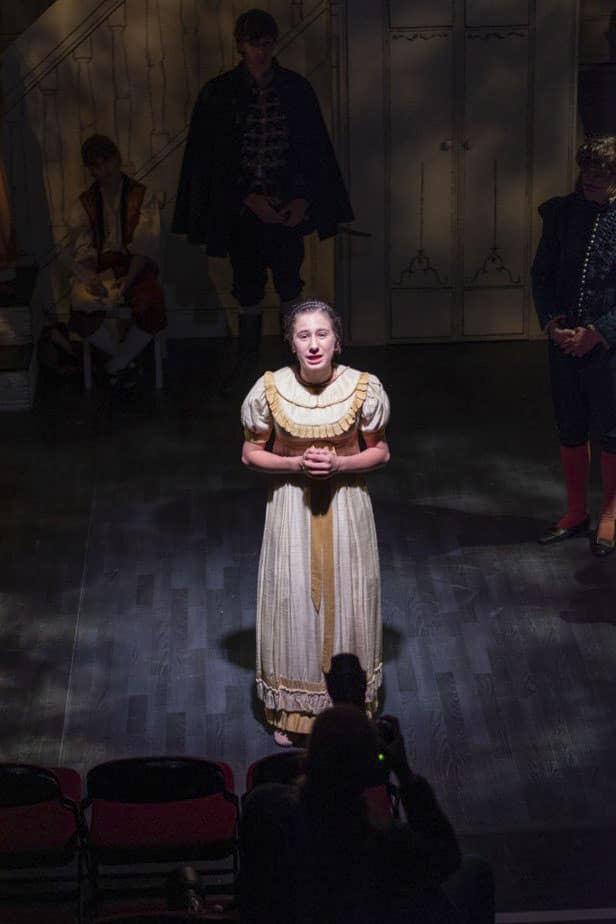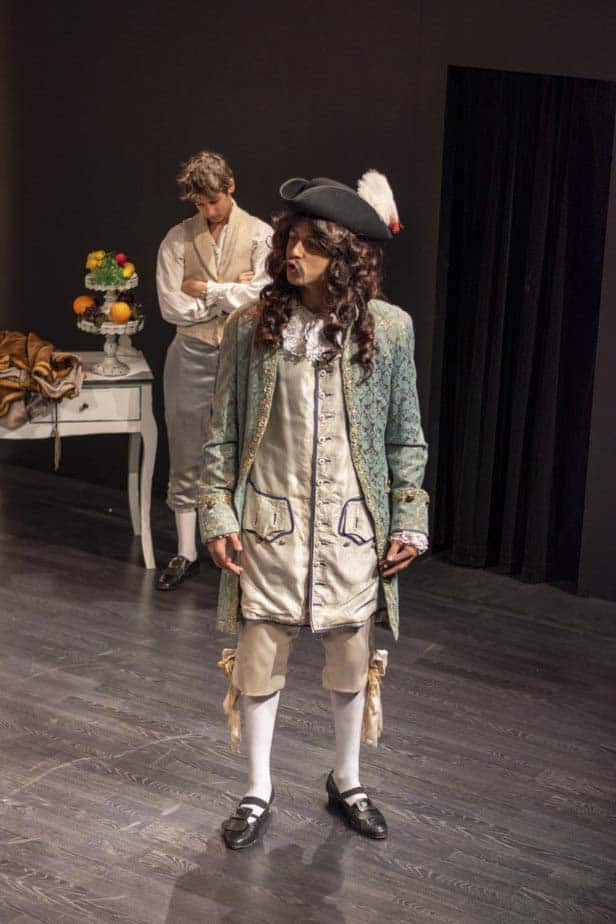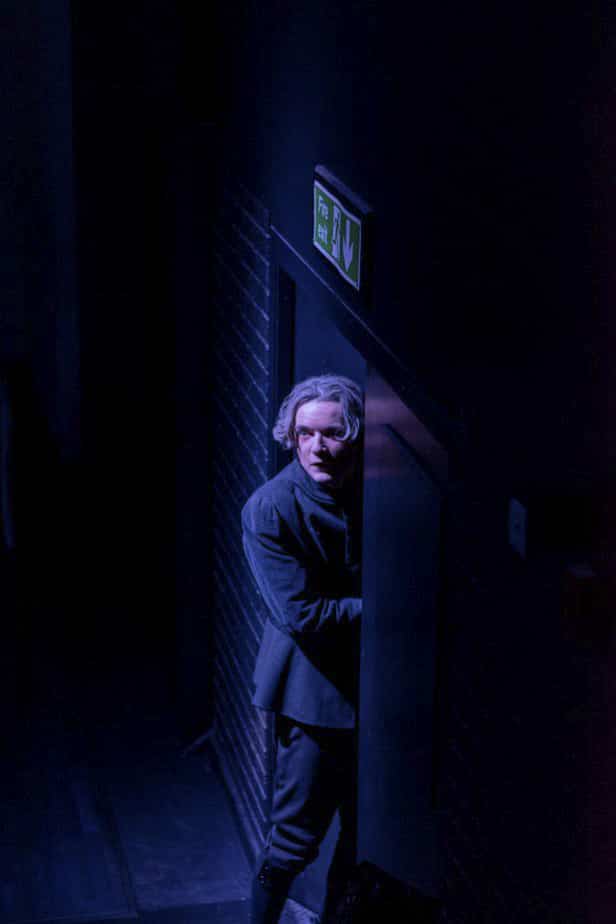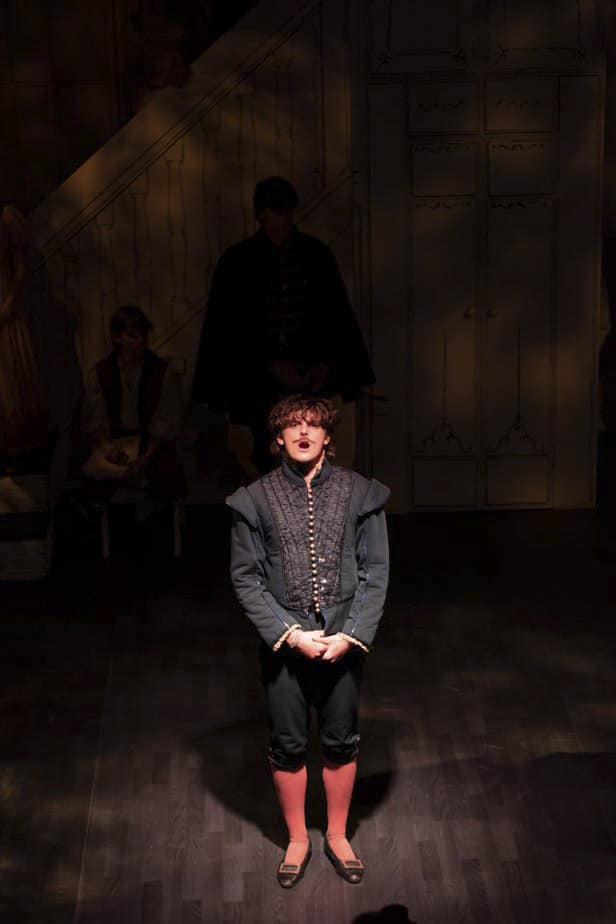Under the direction of Mr Jones, the boys of Penn House performed Molière’s The Skinflint in the Caccia Studio in an outstanding manner. It is the archetype French comedy and delves into the nature of love and materialism, successfully delineating the danger of attachment.
The play commences with a conversation between two lovers, Valere (Albie I) and Elise (Charlie J). They discuss the issue of their financial status and how Elise’s father, Harpagon (Xander L) is an obstacle to their marriage. Consequently, they formulate a plan to confess to Harpagon. Harpagon is a cynical figure and fervently believes that everyone has robbed him. This delirium is portrayed when he smells La Fleche’s (Monty J’s) hand, hoping to find a whiff of money. Harpagon delivers a soliloquy, in which he informs the audience of his fortune’s location, shockingly candid for such an avaricious figure. Through this soliloquy, we learn more about Harpagon’s mental state. Xander L, who played Harpagon, asserted that he ‘is a caricature of people’s insecurities’ hence why he receives an odd sympathy from the audience while allowing for him to be perceived as comical.
After Harpgon’s soliloquy, Cleante (Dylan D) and Elise decide to confess their love to their father. Upon hearing this newfound information, Harpagon argues with his children, stating that he will find them partners. In reprove, Cleante exclaims that his actions are wrong. Almost simultaneously, the tune of an iPhone’s ringtone emerged from the audience, resulting in a glance of disapproval from Harpagon. Accordingly, the phone was switched off. The scene continued, yet the ringtone persisted. Thus, Harpagon seized the device and threw it, hopefully silencing it for eternity. The scene proceeded and it became clear that Harpagon intended to marry Mariane (Jake B), who is Cleante’s lover. Subsequently, Cleante faints. Elise’s fate is no less unfortunate, as it has been arranged that she will marry an old, rich man.
Due to Elise’s admonishment, Harpagon picks a judge for the confrontation, who happens to be Valere – Elise’s lover. As previously alluded to, sycophantic actions are rife within this play as no one wishes to displease Harpagon. Valere deems that both arguments are worthy of merit while managing to skilfully disagree with Harpagon in some regard. However, much to the dismay of Elise, Harpagon’s only reply was ‘no dowry’ which served to emphasise the depth of his greed.
Harpagon provides his children with barely any money. Hence, Cleante is left to find a lender, so that he can provide for Mariane and her frail mother. Fortunately, La Fleche finds someone willing to provide Cleante with a lofty sum. However, this does not come without an extensive list of clauses and subclauses, so much so that the contract rolls along the floor when held. The most Mephistophelian clauses are where the payee must provide the lender with items such as a boiler and a cot. Evidently, this financier is revealed as a true usurper with insatiable desires. Due to a chance meeting, Cleante meets this mysterious lender who in fact is his father. The meeting was comical, with a flurry of back-handed comments.
To bring calm in this tempest, the matchmaker, Frosine (Hector H) arrives. Her light-hearted comments and allusions to British politics shattered the fourth wall and prompted much laughter from the audience. She stated that Mariane only fell in love with geriatrics. Subsequently, the house prepared for Mariane, and here Harpagon’s frugalness was distinctly apparent. He was cruel to his employees, and he did not want to overfeed Mariane, so as to ensure he would lose as little money as possible. This sentiment was characterised by his adage that we should ‘eat to live’ and not ‘live to eat.’ Furthermore, Harpagon stole straw from his own horses, to be as prudent as possible. The first scene ended with the familiar tune of Father and Son by Cat Stevens accentuating the rift between Harpagon and Cleante.
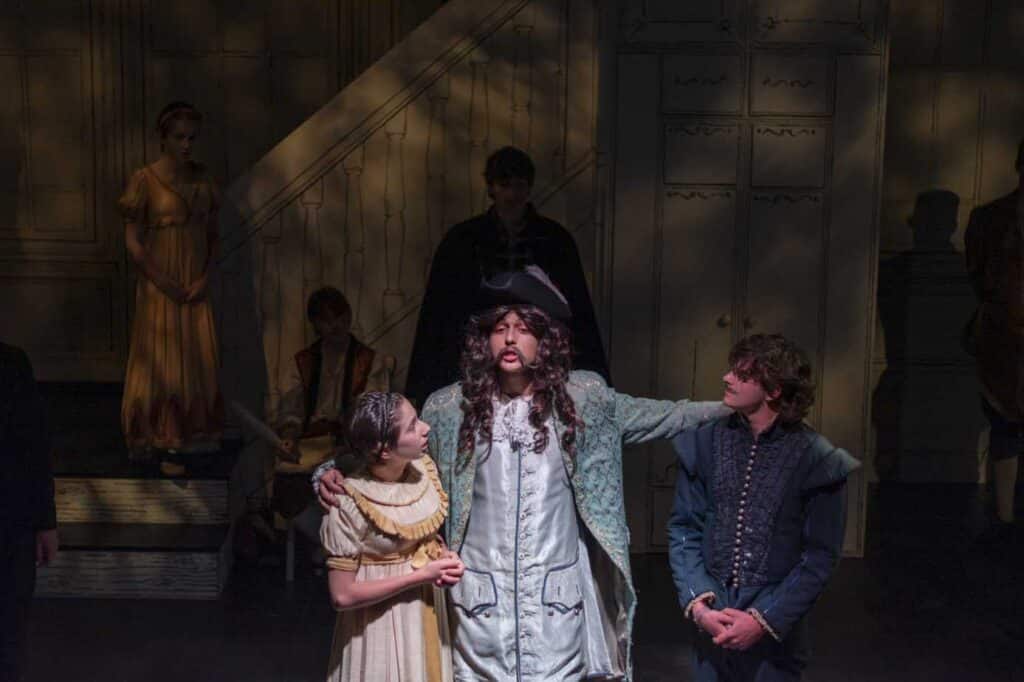
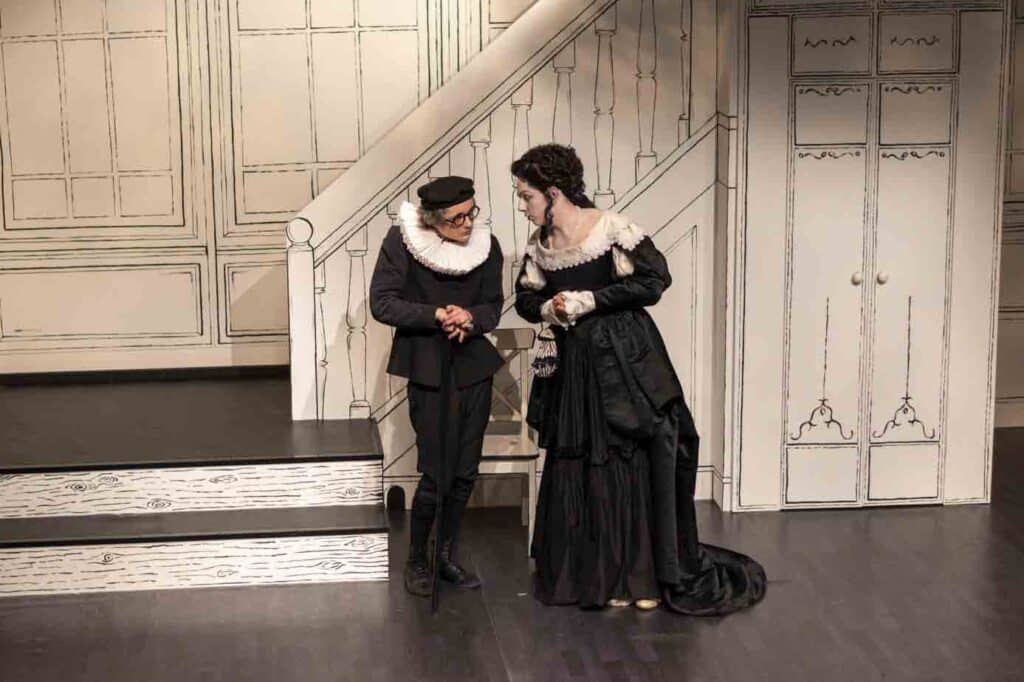
The second scene began with the plotting of Cleante, Elise and Mariane. They all hoped to be with their lovers but are halted by a common obstacle: Harpagon. This amalgamates in yet another confrontation between Harpagon and Cleante and thus, a judge is brought into the conflict: Maitre Jaques. He twists the words of both father and son as they are both moved to opposite ends of the stage. Neither Harpagon nor Cleante can hear the other’s words, falsely making them believe that they have reached a solution. This false peace is short-lived, and a spat ensues. Harpagon shouts ‘I give you my curse’ and Cleante replies pithily that it is nice to be given something, and he consequently leaves. While Cleante has a rich father, he has been living a frugal lifestyle. Yet, it is not only money which he lacks, but also a loving parental figure. So, a vast sense of sympathy is felt for Cleante, who only yearns for love.
Harpagon is left alone on stage and is delirious about being robbed. He frantically checks the closet to no avail. Hence, his suspicions spread to the audience. He hires a magistrate (Jago J) to investigate this ‘pilfering.’ Maitre Jaques strolls onto the stage and is thoroughly questioned. He is swift to place the blame on Valere. So, Valere is sought after and found. He apologises profusely for taking Harpagon’s treasure. Mistakenly, Valere believes Harpagon is speaking of his daughter. So, seeing Valere on the floor, for a crime he did not commit, is truly a sight to behold. This shroud of confusion is only cleared up when money is mentioned. So, Valerie is acquitted of his ‘crimes.’
Consequently, Anselme (Jeremy R), the old man betrothed to Elise, arrives adorned in wondrous and vibrant clothing. He speaks with elongated vowels and received pronunciation successfully creating the archetypal posh voice. At times, it was hard to even hear this, as the laughter of the audience masked his voice! After his arrival, the shroud of mystery pertaining to the characters’ identities was alleviated. The lights darkened and as Valerie was centre stage he professed that he was the son of a rich aristocrat whose ship had crashed. His evidence was a scintillating ruby bracelet encircling his wrist. Then immediately afterwards, Marian is centre-stage and she also declares that she was the daughter of a rich aristocrat. She had lived a life of luxury that was cut short by a crash at sea. So, she had spent the rest of her life caring for her feeble mother. Moreover, Anselme declares that he was Don Thomas D’Alburcy, the infamous aristocrat who had crashed at sea. He recounts his story, and he embraces his children.
Yet, Harpagon is still fixated on his money and wishes to find it. His son knew the whereabouts and states that Harpagon must choose between his money and Mariane’s. Harpagon, being a skinflint, chooses the money. Thus, the aims of all characters were fulfilled. Further emphasising Harpagon’s greed, the play ends with Harpagon clutching his chest of money. The demanding work put into this play by those involved in the acting, production and technical elements of the play is truly commendable. Many congratulations to all involved.

